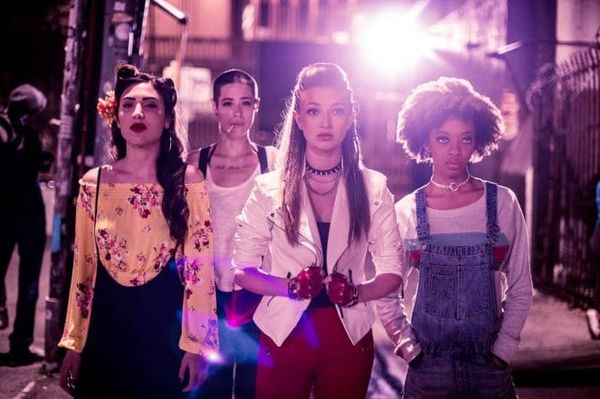Eye For Film >> Movies >> Bit (2019) Film Review
Bit
Reviewed by: Jennie Kermode

The first rule of vampire club - after the one about not talking about vampire club, which head vampire Duke (Diana Hopper) admits she only put in there to try to sound cool, and which doesn't sound cool - is that you never turn a man. "Men can't handle power," Duke says. On the face of it, this seems reasonable - there are plenty of skeezy men in this film doing enough damage as they are - but it opens up another question. Can anybody else?
Though she still acts like a petulant teenager, Duke is apparently centuries old and her special powers extend much further than running around biting people and being unexpectedly strong. Leading her immaculately dressed girl gang around the streets of LA, she's the Heather Chandler of the undead, always immaculate, always mean, always on top. She's everything that shy girl from the sticks Laurel (Nicole Maines) wants to be. Couple this with her flirtatious hanger-on Izzy (Zolee Griggs), who seduces Laurel on her first night out in the big city, and the allure of the dark side is irresistible. What's more, they don't give Laurel much of a choice.

The whole thing about killing people is, of course, where the giddy excitement of being a teenage vampire suddenly gives way to awkwardness, and Bit makes no attempt to be discreet with its gore. Duke reassures the new girl that it's all okay because they're only killing bad people, at least most of the time - and though she tries to refrain, Laurel, in the traditional way of the genre, ultimately gives in to her urges. She's given a heroic reason to do so when the others are threatened by a gang of vampire hunters - because despite Duke's claims, these young women are not just predators, they are also prey. Duke has a secret buried in her past that could be the ruin of them all.
There's a heavy helping of genre clichés in Brad Michael Elmore's pacy, energetic teen thriller, which screened at NewFest 2019, but he succeeds very effectively in updating the old stories for a modern audience. Whilst the scenes that try to create a sense of magic and wonder fall a bit flat, the fight scenes are very effective and the drama that develops between the young women is something many viewers will relate to. Laurel is fleshed out as a character by flashbacks to the home where she grew up and by the presence of her brother, whom she's staying with whilst she gets her bearings in the city. There's a hint that, like Maines, she may be transgender; this deepens the sense that she and her brother have shared a difficult past, but aside from a joke during the credits, it's ignored elsewhere in the story. By taking aim at the Twilight franchise, this joke also serves as a proclamation that the days of dizzy schoolgirls losing their heads over pointy-toothed glittery baseball players several centuries their senior are now very much a part of the past. The new generation of vampire women is carving out a destiny of its own.
Though parts of this film are hyper-stylised as you might expect (including an indulgent flashback sequence set to the strains of Rah Rah Rasputin), Elmore makes the quieter moments of Laurel's life feel very ordinary, creating a realistic sibling dynamic and giving her a slight daffiness that makes it impossible to forget that all these people chowing down on necks and ripping out hearts started out as human. Though Maines is very much the main attraction, anchoring the film with her confident yet nuanced performance, Hopper also makes quite an impression, capturing a coolness rarely seen onscreen these days but occasionally giving us glimpses of the underlying fragility vital to her character. Between them, they capture something of the spirit of the age, a quality vital to every successful vampire film. This isn't destined to become classic cinema but it's a film that will retain its value for those viewers who are just at the right age to fall under its spell. It's cleverer than it looks and its open ending hints at more to come.
Reviewed on: 27 Oct 2019















